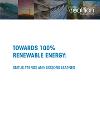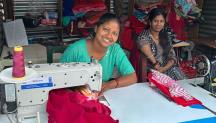

Towards 100% renewable energy: Status, trends and lessons learned
Newsletter
The IRENA Coalition for Action brings together leading renewable energy players from around the world with the common goal of advancing the uptake of renewable energy. The Coalition facilitates global dialogues between public and private sectors to develop actions to increase the share of renewables in the global energy mix and accelerate the global energy transition.
The Coalition has produced a series of white papers and analyses that document case studies and best practices for achieving 100% renewable energy, including recommendations to policy makers on how to support an accelerated energy transformation.
Drawing from case studies of countries, regions, cities and islands moving towards 100% renewables in different end-uses, this white paper offers lessons learned for defining renewable energy targets and developing implementation frameworks for a 100% renewable future. The paper also includes a global mapping of national and sub-national 100% renewable energy targets.
Key takeaways:
- The cost-competitiveness of renewable energy and its associated socio-economic and environmental benefits have become key drivers and motivations for transforming the energy system and establishing a 100% renewable energy target.
- Removing subsidies for unsustainable energy sources effectively levels the playing field for renewables.
- Transparent and well-defined targets, and their effective implementation, are essential to support a development towards a 100% renewable energy system.
- Longer-term legislative and regulatory reliability and transparent and non-discriminatory administrative procedures for renewables deployment are important elements to support increased investment in renewables.
- A broad consensus for 100% renewable energy among relevant stakeholders, citizens, businesses and political decision makers is a good enabler for successful policies and their smooth implementation.
- Increasing system flexibility helps accelerate the shares of renewable energy and the reliability of the energy supply system.
- Capacity building, including vocational training, is needed for the development of a qualified local workforce for a renewables and efficiency-based energy system.




